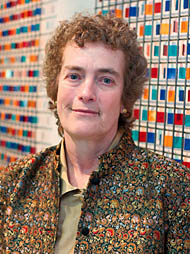Ask Me Another
Two Fulbright Fellowships and a shared interest in dental health brought Pamela Baker ’70 and David Baker ’70 to India for five months in 2005–06.
 |
|
Pamela Baker ’70 is the Helen A. Papaioanou Professor of Biological Sciences. |
David is a clinical dentist and has taught dental hygiene; Pam, a dean of faculty and the Helen A. Papaioanou Professor of Biological Sciences, researches the immune system’s role in periodontal disease. She told staff writer Doug Hubley why this trip to India, their second, offered some surprising lessons. (For more insights, click here for their blog.)
Why did you go to Delhi?
On paper, on the Web, there’s a wonderful outline of public health dentistry in India, and that’s why we went. My project was to help develop ways to incorporate student research into their dental school curriculum. David was going to help implement dental hygiene programs.
Is there a “but” coming?
As it turned out, our school, Maulana Azad Dental College, had just moved into a new building — a gorgeous building. The dean was so busy with the move that he wasn’t able to work on incorporating student research. India is very hierarchical, very top-down, not a lot of delegating, so if he couldn’t work on it, I couldn’t work on it. So that part never happened. The same for Dave, because the public health programs are only on paper.
Yikes! What happened?
A: Fulbright wasn’t too worried, but we felt we were being underutilized. The U.S. embassy sent us around India to give talks. That was really interesting, and we met lots of wonderful people. I also worked with faculty at the dental college, as sort of a resource on cell biology. Dave made inroads in convincing people how important it is that dental diseases are basically preventable.
What did you bring back from the experience?
My interest was to see how science operates in a different culture. That has already helped in a lot of ways here. In my immunology class I can talk about public health in a much more on-the-ground way — in the sense that barriers are sometimes scientific, but cultural factors can also make acceptance of public health efforts easier, or harder. We got firsthand knowledge of that.
India makes you aware of your own assumptions about life in the U.S. We went with the idea that they’d be doing public health dentistry, and realized that we have a bias that they should be doing that. But how much public health dentistry does our federal government fund? Not a lot — some. I definitely learned a lot about India, but in so doing I learned a lot about the US.
On balance, a good experience?
Oh, yes. With a billion people, and India’s only been independent 60 years, they’ve made amazing progress. And just in the seven years since we were there before, it’s transformed in some ways. Scientists that we talked to would comment that seven years ago they didn’t know anybody who owned a car. Now most of them own two cars. There’s an energy and an optimism that’s really exciting to be around.